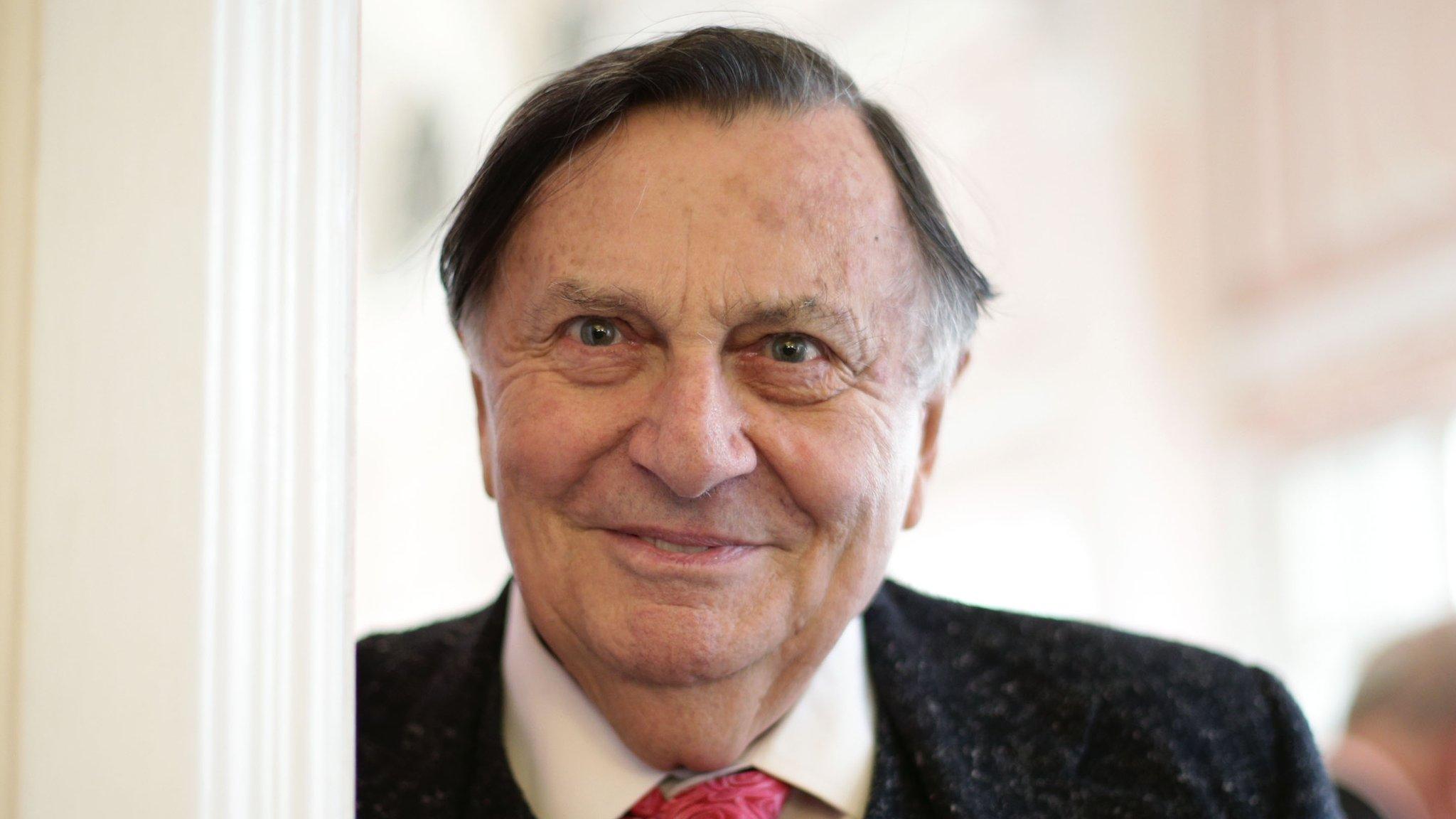Barry Humphries: The satirist and comedian whose life was dominated by Dame Edna Everage
- Published
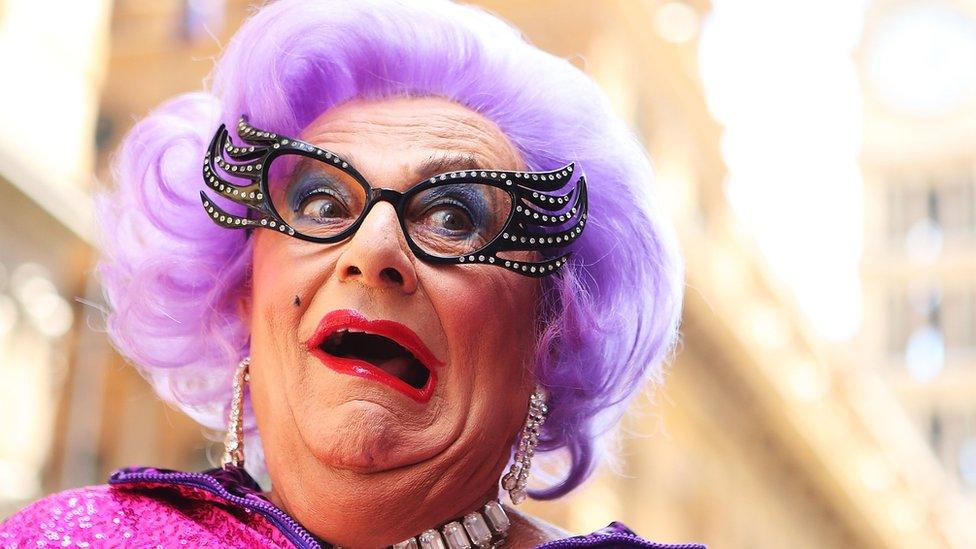
Barry Humphries as Dame Edna Everage
Barry Humphries was described as one of the greatest raconteurs and stand-up comedians of his age.
But his achievements as a writer, painter, actor and scholar were overshadowed by his most monstrous creation, the shrill toned and sequined Dame Edna Everage.
From her humble suburban beginnings in the mid 1950s, plain Mrs Everage morphed into a global superstar, spreading her homespun philosophy and piles of gladioli wherever she went.
On the journey her creator met with critical disapproval and a battle against alcohol abuse, before becoming what the critic Brian Sewell once described as "an institution".
John Barry Humphries was born in the Melbourne suburb of Camberwell on 17 February 1934. His father was a successful builder and the young Humphries had a comfortable upbringing in a pleasant part of the Australian city.
He began inventing fictional characters from an early age, spending hours in his parents' back garden dressing up in various costumes.
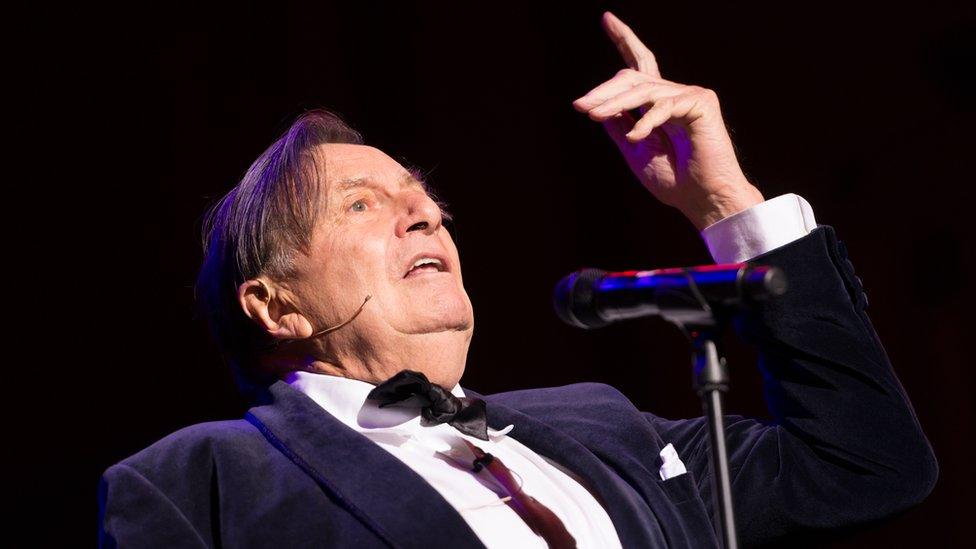
Barry Humphries' family of stage personas poked fun at stereotypical Australian attitudes
He also discovered a gift for entertaining people and once wrote that doing so gave him a great sense of release and helped him find new friends.
His parents sent him to Melbourne Grammar School, an institution that turned out more than its fair share of notable Australian luminaries, boasting leading politicians, artists, soldiers and sportsmen among its alumni.
Humphries excelled at art and English, and largely ignored the rest of the school curriculum, later writing in Who's Who? that he was "self-educated" and attended Melbourne Grammar School.
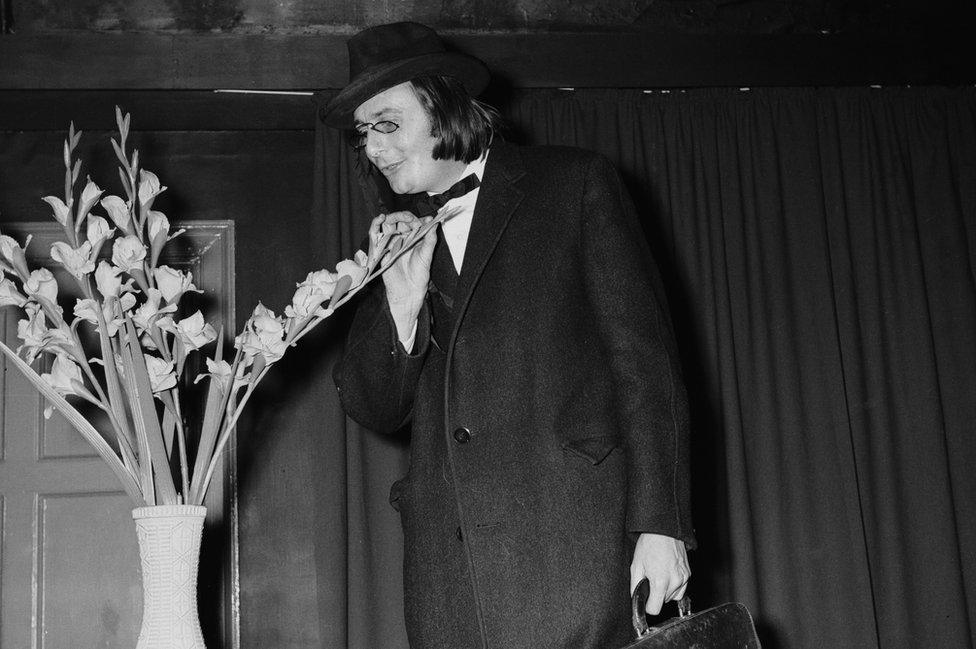
Inspecting the gladioli in 1963
He studied law, philosophy and fine arts at Melbourne University and became famous for a series of publicly performed practical jokes influenced by his interest in the Dada movement.
Politically incorrect
Humphries revelled in the public reactions to his brand of street theatre which illustrated his delight in making his audience feel slightly uncomfortable. It was something that would be a major part of his later career.
After leaving university, he joined the Melbourne Theatre Company where he wrote and performed songs and sketches.
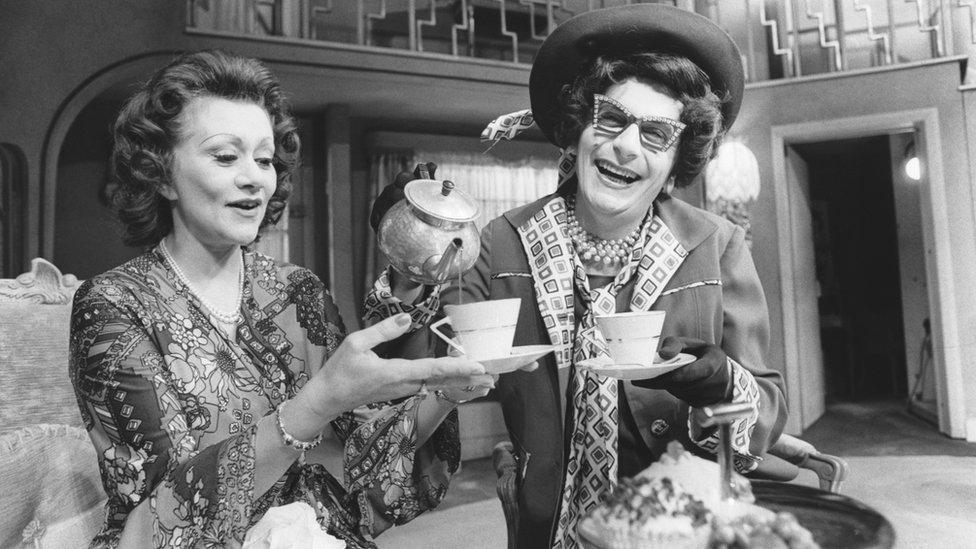
Dame Edna Everage takes tea on stage with the actress Dame Joan Plowright
It was in the theatre company's tour bus that, according to his autobiography, Humphries first came up with the idea of a suburban housewife called Mrs Norm Everage, the character making her first stage appearance in a sketch Humphries performed in 1955.
It was supposed to be a one-off performance but, after Humphries had moved to the Philip Street Revue Theatre in Sydney in 1957, he decided to give Norm, rechristened Edna, another outing and she became something of a hit.
At the time Humphries used Edna, a dull housewife with decidedly politically incorrect views on foreigners, as a satire on his experience of growing up in the conservative suburbs of Melbourne.
In 1959, Humphries moved to London where he quickly became part of the new wave of satirical comedy featuring artists such as Peter Cook, Dudley Moore, Alan Bennett and Jonathan Miller.
He also struck up an unlikely, but long lasting friendship with the Poet Laureate, Sir John Betjeman, with whom he shared a passion for both Victoriana and for Cornwall.
It was in Cornwall in 1962 that his career almost came to a premature end when he fell down a 150 ft cliff near Zennor, breaking a number of bones.
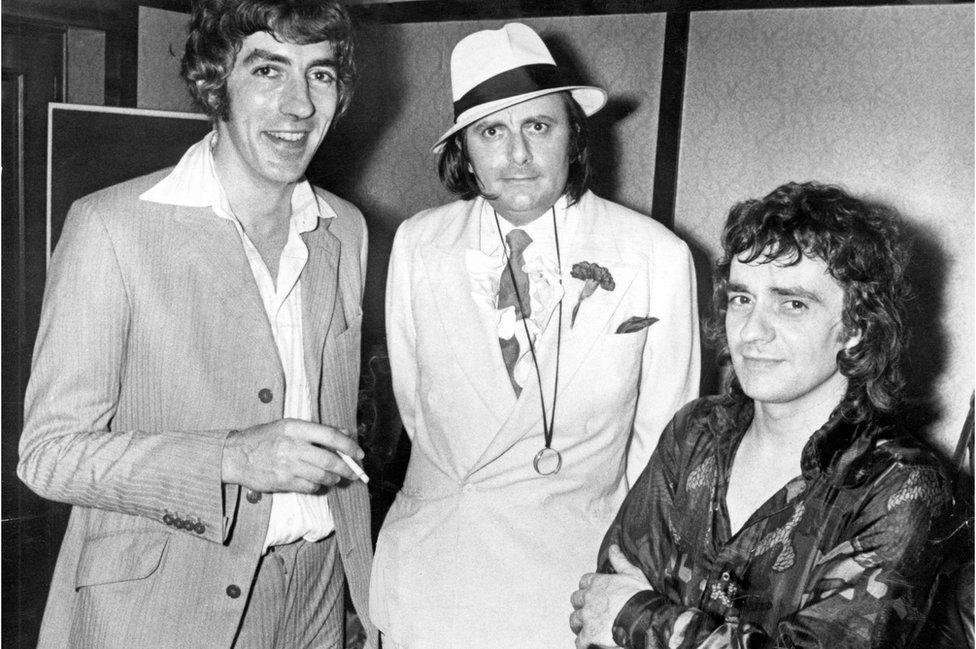
Barry Humphries with Peter Cook and Dudley Moore in the 1970s
Satire
Humphries created the character, Barry McKenzie, the boorish, sexist, arrogant Australian, who appeared in a comic strip he wrote for the magazine, Private Eye.
There was much criticism of this character in his home country of Australia which, for a time, banned the sale of a book of the strips. Humphries would receive similar criticism for his character of the lecherous, hard drinking Sir Les Patterson.
He was happy to return the compliment. "Australia is an outdoor country," he once said. "People only go inside to use the toilet. And that's a recent development."
Edna Everage was not well received by the critics when Humphries first launched her onto the London scene, but he was encouraged by Peter Cook to continue to develop the character.
His big theatrical break came when he was offered the part of Mr Sowerberry the undertaker in the 1960 stage production of Lionel Bart's stage musical Oliver, and transferred with the show when it was moved to Broadway in 1963.
Four years later, he took the role of Fagin when the show was revived on the London stage.
He returned to Australia where he toured a series of satirical one man shows featuring Edna Everage and Les Patterson, and the more gentle, and later deceased, Sandy Stone who Humphries described as "Melbourne talking in its sleep."
In 1973, he co-wrote and appeared in the film, The Adventures of Barry McKenzie, with Barry Crocker playing the title role and Humphries appearing as Aunt Edna. The film also featured a string of stars including Peter Cook, Spike Milligan, Willie Rushton and Joan Bakewell.
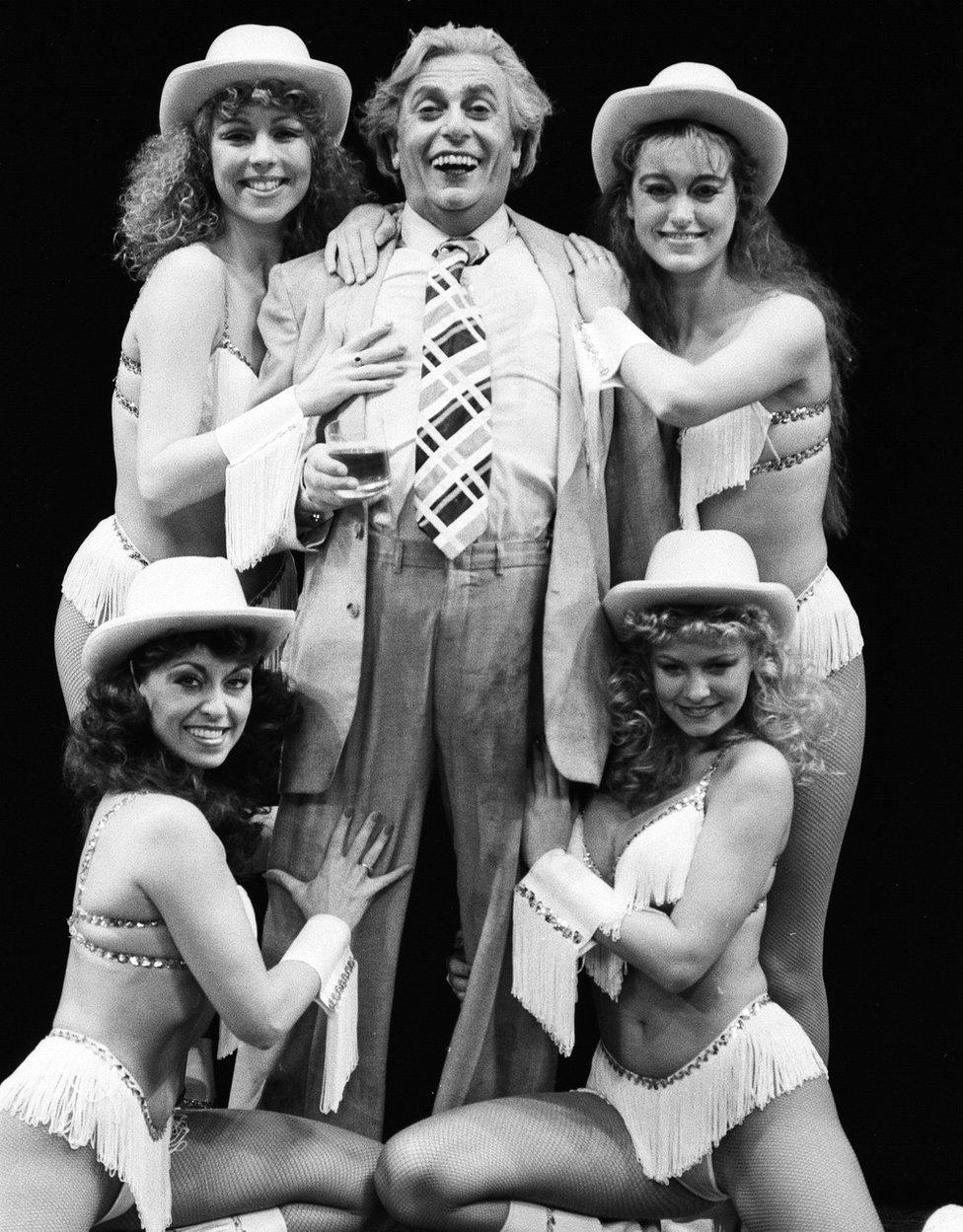
Sir Les Patterson was as uncouth as Dame Edna was refined
Masterpieces
In the 1974 sequel, Barry McKenzie Holds His Own, Edna is created a dame by the then Australian Prime Minister Gough Whitlam.
But his success came at a price. He had begun to drink heavily during his time in London and on one trip back to Australia, he was found slumped on the side of a street. His parents arranged for him to undergo treatment, following which he gave up alcohol altogether.
Despite his various film and stage appearances, it was in his one man shows that Humphries achieved his greatest following both in the UK and Australia.
After a shaky start, he appeared in a series of stage shows including Housewife, Superstar in 1976 and An Evening's Intercourse with Dame Edna in 1982.
Often lasting more than two hours, his performances were masterpieces of original material and improvisation spiced with the barbed insults Edna often aimed at members of her audiences.
"Tiles only halfway up the wall, darling?" she would say in discussion with a victim about bathroom decor. "What went wrong, dear - did you run out of money?"
He also became a regular on UK television with The Barry Humphries Show on the BBC and ITV's The Dame Edna Experience.
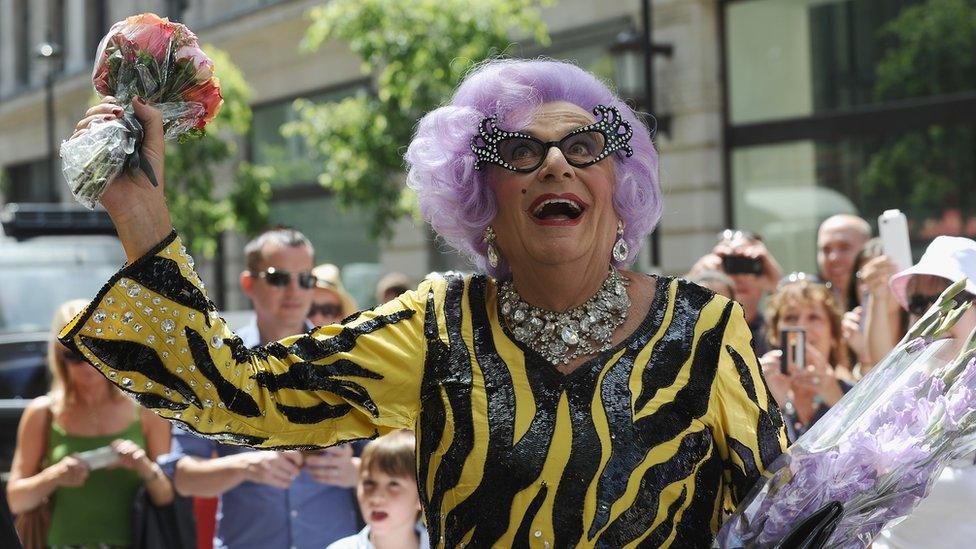
The housewife superstar from Moonee Ponds
By this time the dowdy housewife from Moonee Ponds had turned into a global megastar, flitting between her many luxurious residences across the world and pausing only to advise world leaders and throw armfuls of gladioli to her adoring audiences.
Apart from musicians or dancers, Humphries was only ever joined by one other person onstage - the silent Madge, played by English actor Emily Perry, who was Dame Edna's long-suffering best friend and bridesmaid.
Virile and vulgar
Over time Dame Edna's costumes became more extravagant, with her dresses adorned by Australian icons such as kangaroos, koalas and the Sydney Opera House.
It took the Americans decades to get his particular brand of satirical humour, but Humphries finally achieved success in the US in 1999, when Dame Edna: The Royal Tour opened on Broadway, eventually running for 10 months.
Away from the stage Humphries was passionate about art and literature. A talented artist, he championed the work of many painters, particularly Charles Conder, whose works featured in a BBC documentary which Humphries presented.
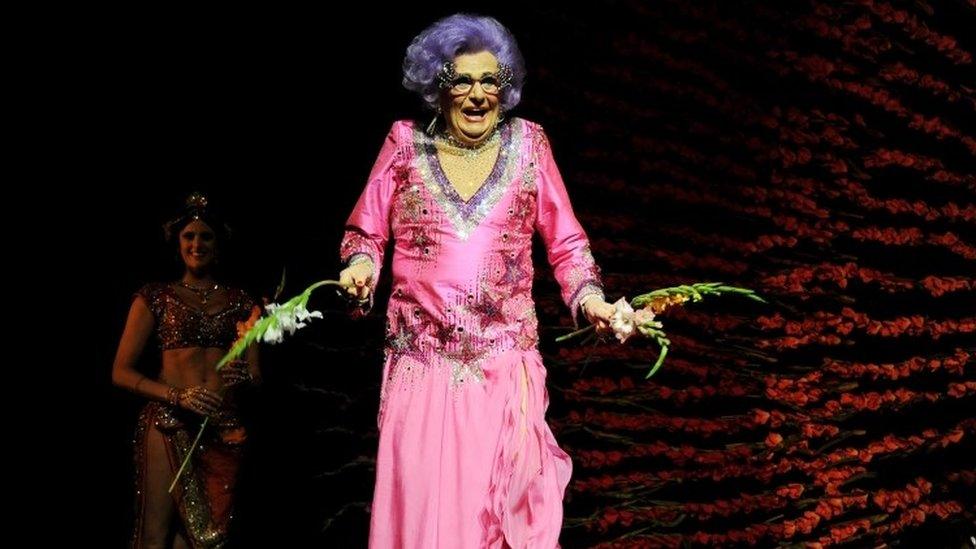
"Virile, vulgar and magnificent"
He wrote several plays, books, novels, and autobiographies for which he won a number of awards including the J.R. Ackerley prize for biography in 1993.
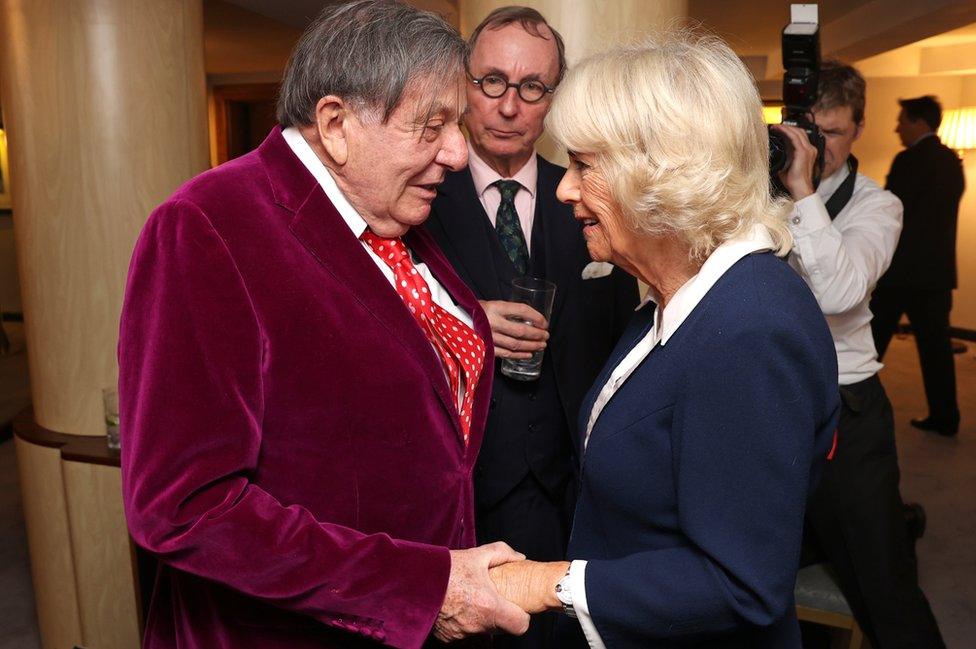
Barry Humphries greeting Camilla, the then Duchess of Cornwall, in 2021
In 2012, he announced he was retiring from live performances and set off on a farewell tour of Australia to huge critical acclaim, one reviewer describing Humphries "as virile, as vulgar and as magnificent as ever." The tour moved on to the UK, before taking America by storm.
A rare sour note came in 2019 when accusations of transphobia led to a major comedy prized named after him being renamed.
In comments he later said had been misinterpreted, he drew criticism for describing being transgender as "a fashion" and also claimed to have been speaking in character with a reference to gender-reassignment surgery as "self-mutilation".
Controversy aside, the lure of the limelight proved too strong, and in 2022, he emerged from self-imposed exile with The Man in the Mask: a series of shows looking back at his long career.
Fast approaching 90, his immaculate comic timing was still as sharp as ever. When he whipped out Dame Edna's famous glasses, there was an enormous cheer.
For more than 60 years, Barry Humphries held a mirror to Australia and Australians, revealing their virtues and weaknesses through a gallery of adored characters,
"It's a kind of therapy," he once said, "I'd miss it if I couldn't do it".
Related topics
- Published23 April 2023
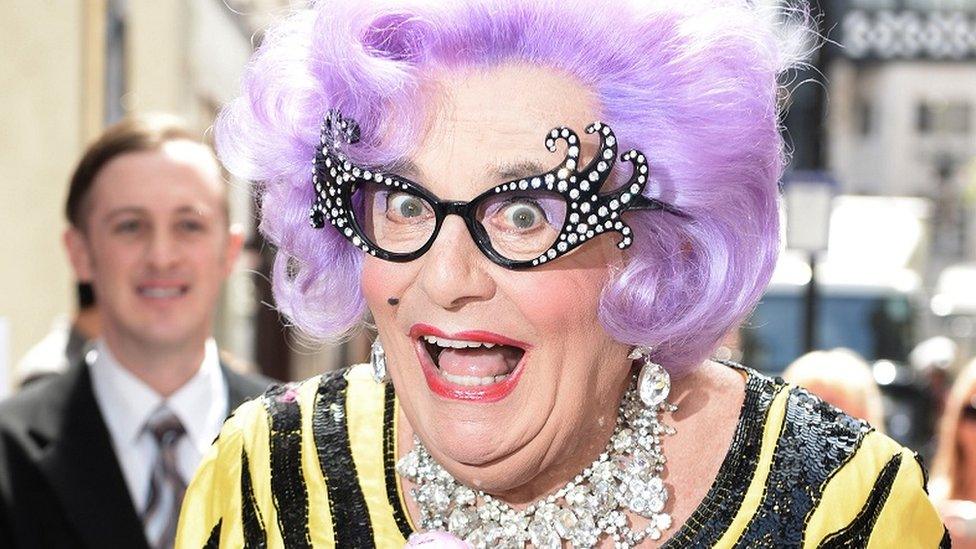
- Published22 April 2023
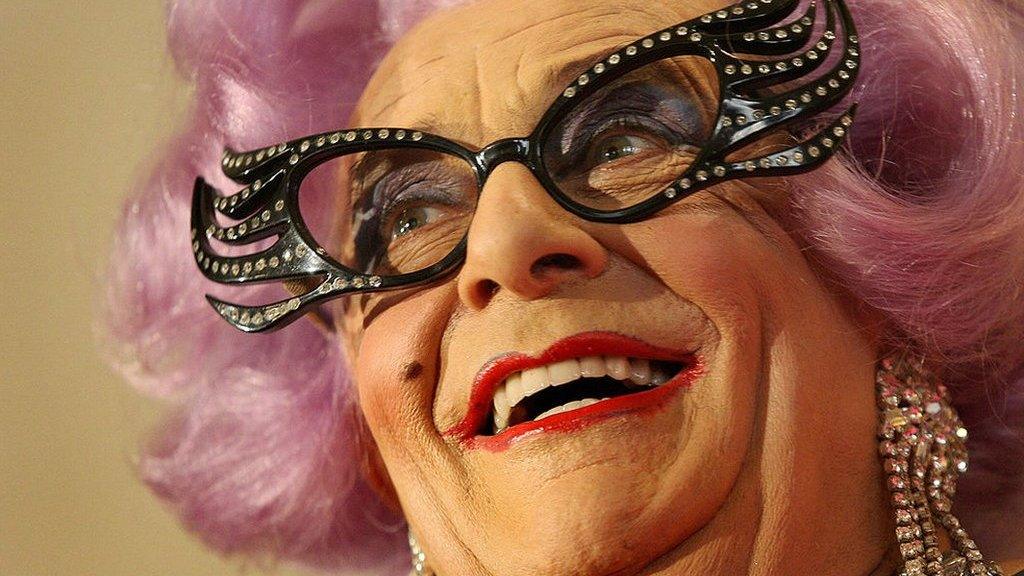
- Published22 April 2023
